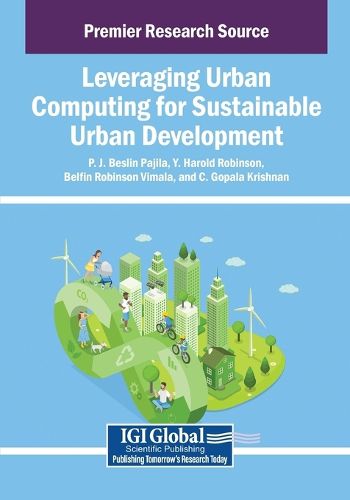Readings Newsletter
Become a Readings Member to make your shopping experience even easier.
Sign in or sign up for free!
You’re not far away from qualifying for FREE standard shipping within Australia
You’ve qualified for FREE standard shipping within Australia
The cart is loading…






This title is printed to order. This book may have been self-published. If so, we cannot guarantee the quality of the content. In the main most books will have gone through the editing process however some may not. We therefore suggest that you be aware of this before ordering this book. If in doubt check either the author or publisher’s details as we are unable to accept any returns unless they are faulty. Please contact us if you have any questions.
Key technologies, such as Internet of Things (IoT), artificial intelligence (AI), big data analytics, and cloud computing, can be used to create intelligent, data driven cities that address complex urban challenges. Innovations in urban computing may effectively manage and control systems for traffic congestion, energy consumption, environmental monitoring, and waste management. As a result, these cutting-edge technologies can reshape urban environments for enhanced sustainability, efficiency, and citizen wellbeing. Further exploration of these technological impacts may project how future developments will further revolutionize urban living and governance. Leveraging Urban Computing for Sustainable Urban Development examines smart cities and urban computing, offering new insights into how emerging technologies can address pressing urban challenges and providing actionable insights for policymakers and urban planners. The emphasis on sustainability, social equity, and accessibility influences future smart city governance, ensuring that future developments prioritize inclusivity and resource efficiency. Covering topics such as remote monitoring, urban-rural sustainability dynamics, and disaster management, this book is an excellent resource for urban planners, government officials, policymakers, engineers, environmental scientists, business owners, researchers, academicians, and more.
$9.00 standard shipping within Australia
FREE standard shipping within Australia for orders over $100.00
Express & International shipping calculated at checkout
Stock availability can be subject to change without notice. We recommend calling the shop or contacting our online team to check availability of low stock items. Please see our Shopping Online page for more details.
This title is printed to order. This book may have been self-published. If so, we cannot guarantee the quality of the content. In the main most books will have gone through the editing process however some may not. We therefore suggest that you be aware of this before ordering this book. If in doubt check either the author or publisher’s details as we are unable to accept any returns unless they are faulty. Please contact us if you have any questions.
Key technologies, such as Internet of Things (IoT), artificial intelligence (AI), big data analytics, and cloud computing, can be used to create intelligent, data driven cities that address complex urban challenges. Innovations in urban computing may effectively manage and control systems for traffic congestion, energy consumption, environmental monitoring, and waste management. As a result, these cutting-edge technologies can reshape urban environments for enhanced sustainability, efficiency, and citizen wellbeing. Further exploration of these technological impacts may project how future developments will further revolutionize urban living and governance. Leveraging Urban Computing for Sustainable Urban Development examines smart cities and urban computing, offering new insights into how emerging technologies can address pressing urban challenges and providing actionable insights for policymakers and urban planners. The emphasis on sustainability, social equity, and accessibility influences future smart city governance, ensuring that future developments prioritize inclusivity and resource efficiency. Covering topics such as remote monitoring, urban-rural sustainability dynamics, and disaster management, this book is an excellent resource for urban planners, government officials, policymakers, engineers, environmental scientists, business owners, researchers, academicians, and more.